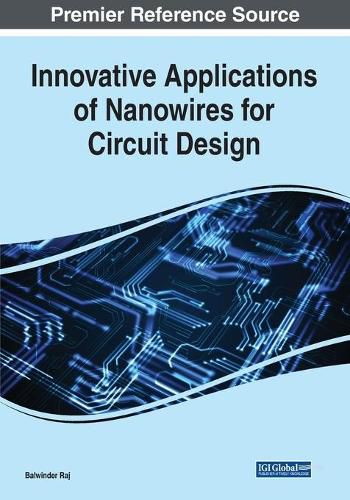Readings Newsletter
Become a Readings Member to make your shopping experience even easier.
Sign in or sign up for free!
You’re not far away from qualifying for FREE standard shipping within Australia
You’ve qualified for FREE standard shipping within Australia
The cart is loading…






This title is printed to order. This book may have been self-published. If so, we cannot guarantee the quality of the content. In the main most books will have gone through the editing process however some may not. We therefore suggest that you be aware of this before ordering this book. If in doubt check either the author or publisher’s details as we are unable to accept any returns unless they are faulty. Please contact us if you have any questions.
Nanowires are an important sector of circuit design whose applications in very-large-scale integration design (VLSI) have huge impacts for bringing revolutionary advancements in nanoscale devices, circuits, and systems due to improved electronic properties of the nanowires. Nanowires are potential devices for VLSI circuits and system applications and are highly preferred in novel nanoscale devices due to their high mobility and high-driving capacity. Although the knowledge and resources for the fabrication of nanowires is currently limited, it is predicted that, with the advancement of technology, conventional fabrication flow can be used for nanoscale devices, specifically nanowires.
Innovative Applications of Nanowires for Circuit Design provides relevant theoretical frameworks that include device physics, modeling, circuit design, and the latest developments in experimental fabrication in the field of nanotechnology. The book covers advanced modeling concepts of nanowires along with their role as a key enabler for innovation in GLSI devices, circuits, and systems. While highlighting topics such as design, simulation, types and applications, and performance analysis of nanowires, this book is ideally intended for engineers, practitioners, stakeholders, academicians, researchers, and students interested in electronics engineering, nanoscience, and nanotechnology.
$9.00 standard shipping within Australia
FREE standard shipping within Australia for orders over $100.00
Express & International shipping calculated at checkout
This title is printed to order. This book may have been self-published. If so, we cannot guarantee the quality of the content. In the main most books will have gone through the editing process however some may not. We therefore suggest that you be aware of this before ordering this book. If in doubt check either the author or publisher’s details as we are unable to accept any returns unless they are faulty. Please contact us if you have any questions.
Nanowires are an important sector of circuit design whose applications in very-large-scale integration design (VLSI) have huge impacts for bringing revolutionary advancements in nanoscale devices, circuits, and systems due to improved electronic properties of the nanowires. Nanowires are potential devices for VLSI circuits and system applications and are highly preferred in novel nanoscale devices due to their high mobility and high-driving capacity. Although the knowledge and resources for the fabrication of nanowires is currently limited, it is predicted that, with the advancement of technology, conventional fabrication flow can be used for nanoscale devices, specifically nanowires.
Innovative Applications of Nanowires for Circuit Design provides relevant theoretical frameworks that include device physics, modeling, circuit design, and the latest developments in experimental fabrication in the field of nanotechnology. The book covers advanced modeling concepts of nanowires along with their role as a key enabler for innovation in GLSI devices, circuits, and systems. While highlighting topics such as design, simulation, types and applications, and performance analysis of nanowires, this book is ideally intended for engineers, practitioners, stakeholders, academicians, researchers, and students interested in electronics engineering, nanoscience, and nanotechnology.